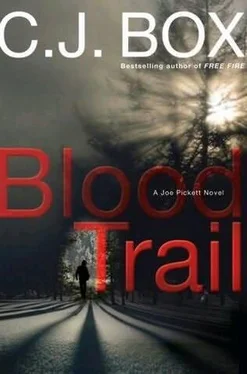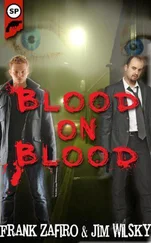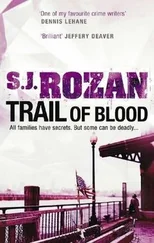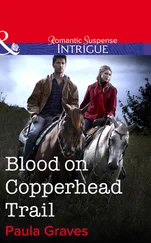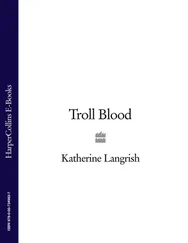Joe pulled over to watch the assemblage and recognized Chris Urman lining up to be one of the volunteers. Leaving his truck running, he approached Urman and tried to keep out of McLanahan’s view.
“How are you doing?” Joe asked. “Is your family okay?”
Urman shrugged. “My aunt is a mess, of course, but we’re hanging in there.”
“Be careful up there,” Joe said. “It could be chaos.”
Urman nodded toward the sheriff. “I get that impression. We’re not exactly being organized here with military precision. But I’ve got to do somethimg to redeem myself.”
“You are blameless for what happened.”
“I wish I felt that way,” Urman said. “I mean, I killed a man. It’s the worst feeling in the world. I hope you never have to experience it.”
Joe looked down at his boots. “I have and you’re right.”
“It changes you.”
“Yup.”
A SMALL GROUP of Klamath’s followers stood to the side of the volunteers, jeering them. One of the protesters saw the same similarity to a western Joe had noted and started humming the theme to the old western television program Bonanza , and the rest eventually joined in…
Bum-duh-duh-Bum-duh-duh-Bum-du-duh-Bum BONANZA! Bum-duh-duh-Bum-duh-duh-Bum-du-duh-Bum BONANZA!
… until the theme got stuck in Joe’s head like musical peanut butter and he couldn’t get rid of it the rest of the morning.
AT BREAKFAST, Reed shook his head and looked down at his uneaten eggs. “I felt real sad when those boys roared out of here all full of piss and vinegar. They’d love to find the shooter and bring him back so the moratorium will be lifted and they’ll be a bunch of heroes. But I don’t see it happening.”
Joe said to Reed, “I don’t think our shooter is just roaming around up there waiting to be caught. I doubt he’s still up there at all.”
Reed looked over the top of his coffee cup at Joe.
Joe said, “I would speculate that the shooter was there on the street this morning singing the theme to Bonanza .”
Reed snorted.
“I didn’t see Klamath Moore or his wife in that assembly this morning,” Joe said. “Did you?” Or Bill Gordon or Alisha Whiteplume or Nate Romanowski, Joe thought.
“Nope,” Reed said.
“I wonder where he is.”
Reed shrugged. “I hear the guy keeps on the move.”
Joe hoped Gordon was still around.
Reed sat back and put his coffee cup down. He looked like a man with a pain in his stomach. “I just wish Klamath Moore and his ilk would go away,” Reed said. “When they’re around it’s like I don’t know this place anymore. Everything seems off-kilter, if you know what I mean. We’ve always been sort of insulated from all of that activist crap here in our nice little town.”
Joe said, “Yup.”
“Maybe this is the beginning of the end,” Reed said. “Maybe all that stuff from the outside about animal rights and such has found us.”
JOE PARKED his pickup at the side of Nate’s house near the Twelve Sleep River and got out. It was high noon, still, cloudless, in the forties but dropping by the minute. He could hear the gossipy murmur of the river as he circled the house and the empty falcon mews. There was no point knocking on the door because there was obviously no one inside. And there were no birds in the sky.
What he noted, though, was a set of tire tracks coming in and going out. And the footprints-at least five sets-in the mud and dust near the front door. They’d been there, the whole carload of them, Joe thought. Nate, Alisha, Klamath Moore, Moore’s wife, Bill Gordon. The footprints led to the threshold and came back out again.
So Nate, Mr. Neighborly, had invited them inside, Joe thought. Perhaps they’d all taken chairs around Nate’s old dining table and sipped cocktails? Maybe Nate baked them a cake? Maybe they laughed and joked about how it had all come together as planned and Nate was now free to move about the country.
Just to make himself feel a little better, Joe kicked Nate’s door with the toe of his boot before leaving.
Hard pellets of snow strafed the ground and bounced off the hood of his truck. He was glad he’d thrown his thick Carhartt jacket into his vehicle that morning because, blink , it was winter.
THE SNAP winter storm roared through the Bighorns throughout Wednesday and into Thursday. Sheriff McLanahan’s search for the killer was postponed indefinitely Wednesday night when one of his volunteers-Joe and Marybeth’s plumber-was mortally wounded by another volunteer who mistook him for someone suspicious and shot him in the chest in close to zero visibility conditions.
That night, Joe reread Bill Gordon’s files and tried to watch television with Marybeth and Lucy but found himself wondering when, and if, Nate Romanowski would appear.
ON THURSDAY, Joe cruised his pickup on the gravel roads of the Wind River Indian Reservation. Fallen leaves like tiny cupped hands skittered across the lawns to pile up against fences and brush. Wood smoke from the chimneys of small box houses refused to rise in the cold and hung close to the ground. Some houses had lawns, fences, trees, hedges. Some had pickup trucks mounted on blocks without engines or doors.
He had always been struck by the number of basketball back-boards and hoops on the reservation. Nearly every house had one, and they were mounted on power poles and on the trunks of trees. In the fall, during hunting season, antelope and deer carcasses hung from them to cool and age. In the summer, they were used by the children. Joe counted six fat mule deer hanging in one block and realized the moratorium the governor had placed on state lands wouldn’t apply to reservation lands, which were sovereign.
The reservation high school was a modern redbrick structure with well-kept lawns and nothing about to suggest the students were Northern Arapaho or Eastern Shoshone. The only student Joe saw outside was wearing a gray hoodie, smoking a cigarette, and listening to his iPod.
After checking the teachers’ lot for Alisha Whiteplume’s car (the SUV he’d seen through the binoculars), Joe parked and went in.
THE MAIN HALLWAY of the school was dark and empty. His boots echoed on the linoleum. Classes were in session, and he glanced through windows in the closed doors to see teachers teaching, students sprawled at their desks, a few catching his eye as he passed. The teachers’ names were printed on construction paper outside each door, and he paused at the one reading MISS WHITEPLUME. Inside was obviously a substitute teacher-a man in his midtwenties with shoulder-length hair and round wire-rimmed glasses. He was explaining something to the students but their glassy-eyed response unveiled his ineffectiveness.
Student artwork decorated the walls, pen-and-ink the medium. Joe was struck by how similar the work was to what he saw in the hallways of Saddlestring High School in town; how little distinctively Indian was included in subject and theme. In fact, he thought, he’d seen more warriors and mystical American Indian scenes in town than he saw on the reservation. Plenty of typical teenage dark-minded fantasy stuff, though, as well as NBA, hip-hop, and NASCAR-THEMED scenarios. Farther down the hall, closer to the office, were framed photos of graduating classes dating back more than forty-five years, many of which had once been displayed in the old high school before this new one was built. The graduate displays slowed him, and his eyes looted through the cameo photos.
The faces that looked back at him from year to year reflected the styles and attitudes of the sixties, seventies, eighties, nineties, to the present. The number of graduates grew and receded from year to year, and he couldn’t tell if there were many more students at present than there had been forty years ago. There were sullen faces, hopeful faces, fierce faces, doomed faces. Because of the high mortality rate on the reservation, he recognized some of the recent names as accident victims, overdose victims, shooting victims. Too many from the recent classes were already gone, he thought.
Читать дальше
